Module 3 Adventure in Literature and the Cinema 试卷化作业
文档属性
| 名称 | Module 3 Adventure in Literature and the Cinema 试卷化作业 |
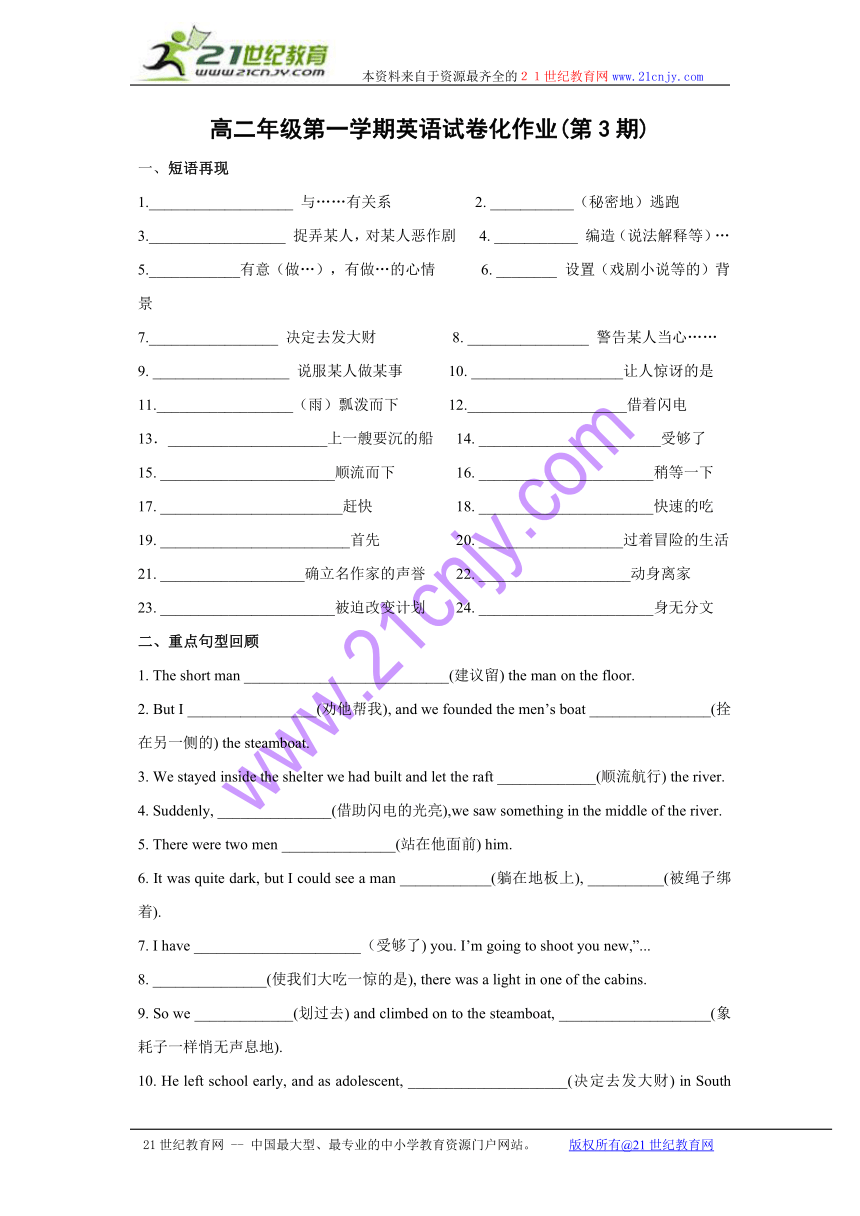
|
|
| 格式 | rar | ||
| 文件大小 | 21.8KB | ||
| 资源类型 | 教案 | ||
| 版本资源 | 外研版 | ||
| 科目 | 英语 | ||
| 更新时间 | 2009-07-16 18:17:00 | ||
图片预览

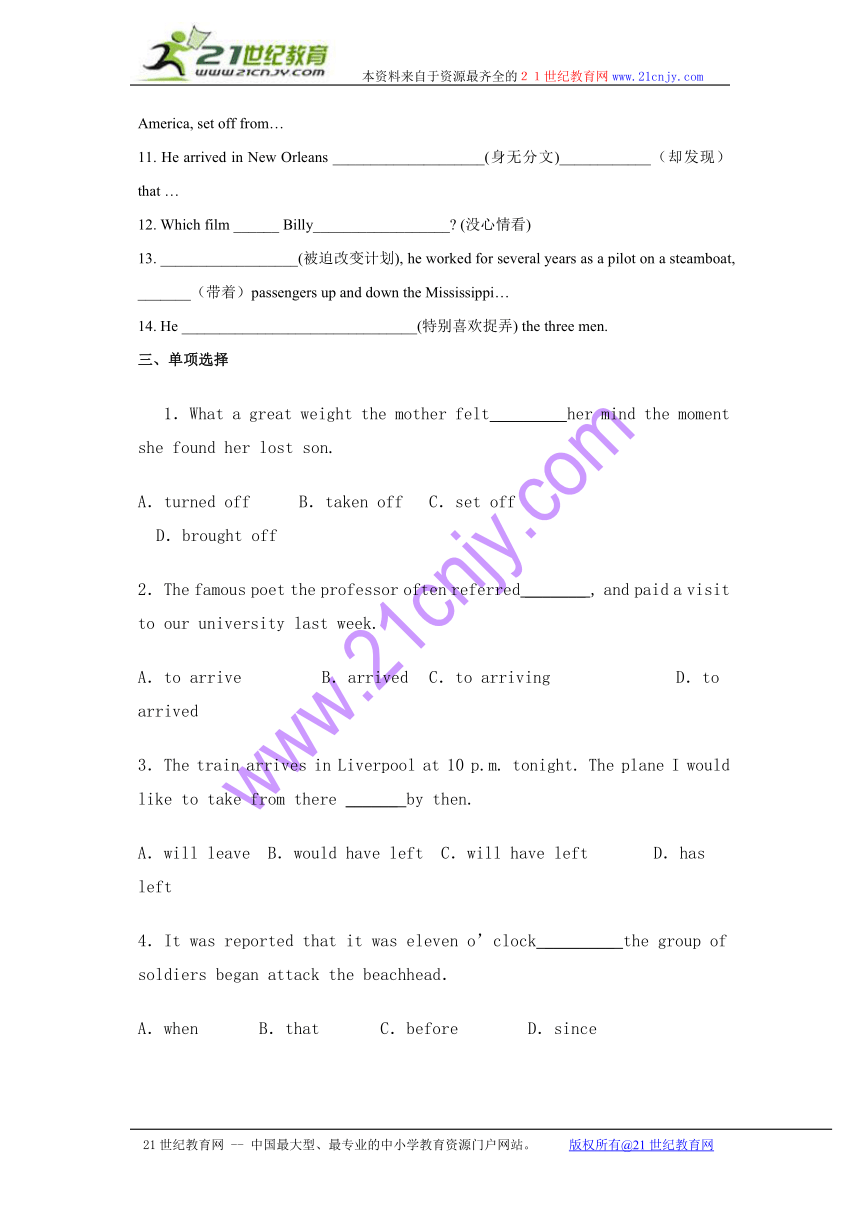
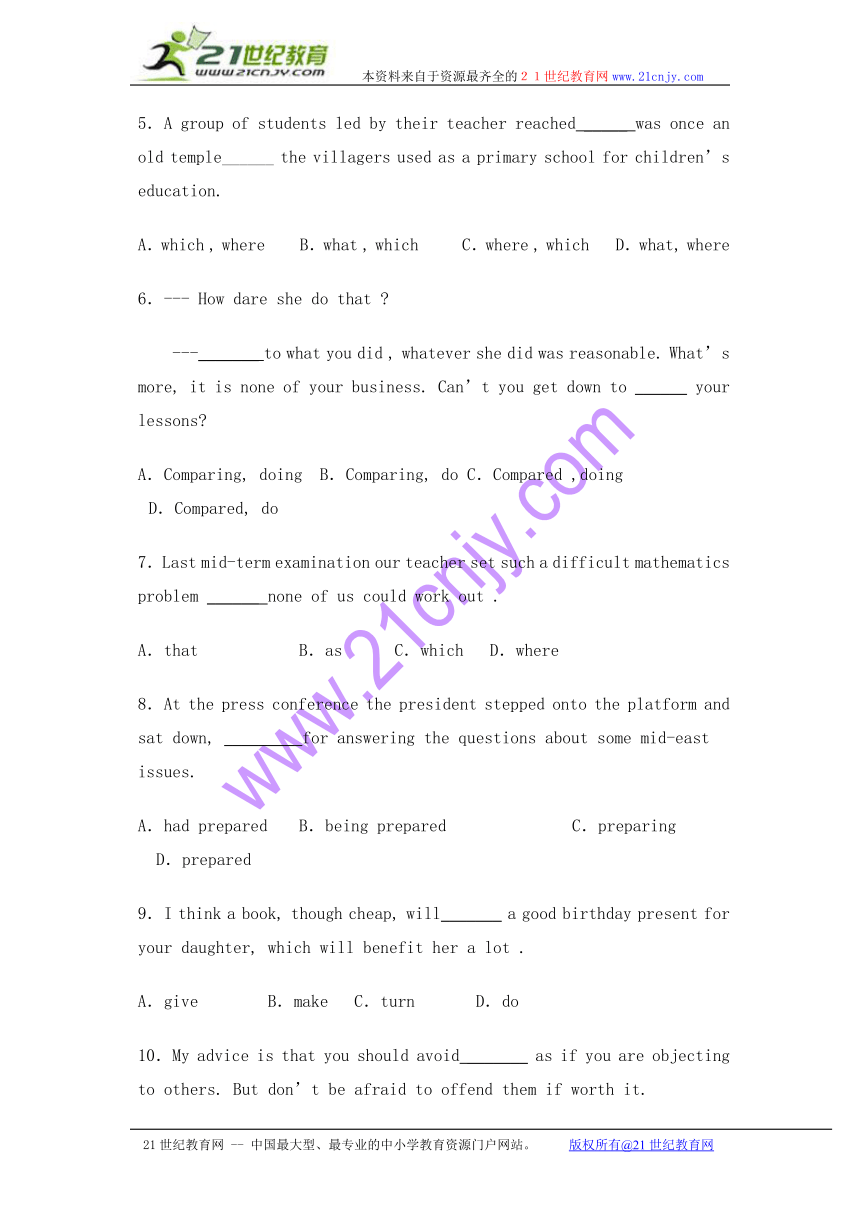
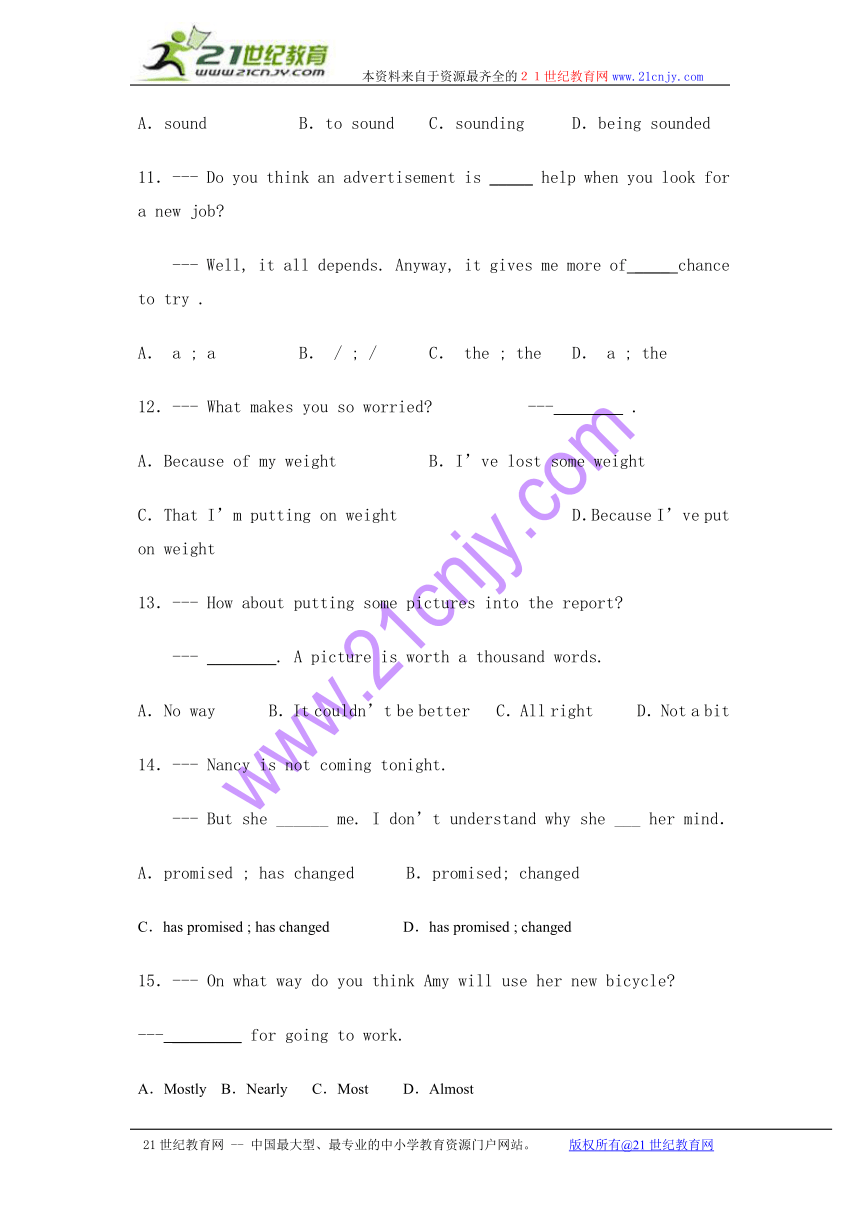
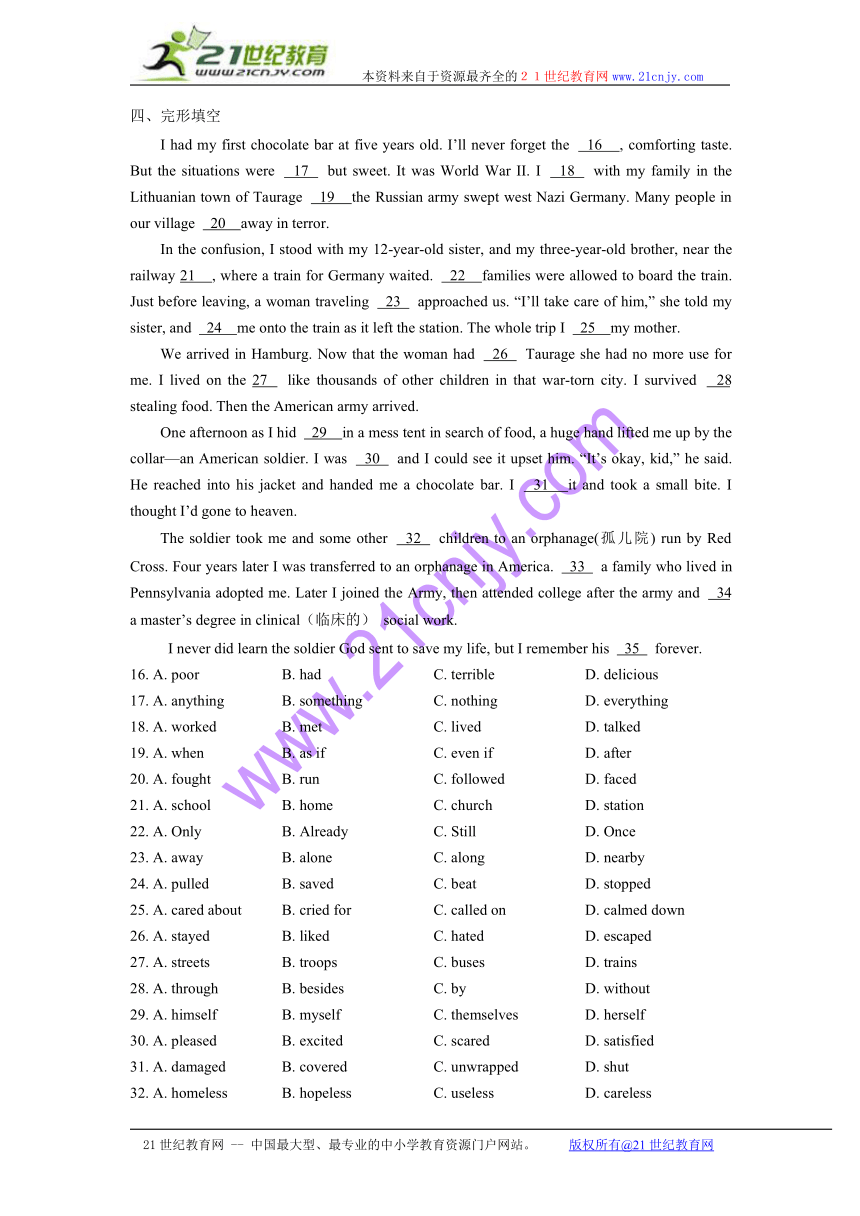
文档简介
本资料来自于资源最齐全的21世纪教育网www.21cnjy.com
高二年级第一学期英语试卷化作业(第3期)
一、短语再现
1.___________________ 与……有关系 2. ___________(秘密地)逃跑
3.__________________ 捉弄某人,对某人恶作剧 4. ___________ 编造(说法解释等)…
5.____________有意(做…),有做…的心情 6. ________ 设置(戏剧小说等的)背景
7._________________ 决定去发大财 8. ________________ 警告某人当心……
9. __________________ 说服某人做某事 10. ____________________让人惊讶的是
11.__________________(雨)瓢泼而下 12._____________________借着闪电
13._____________________上一艘要沉的船 14. ________________________受够了
15. _______________________顺流而下 16. _______________________稍等一下
17. ________________________赶快 18. _______________________快速的吃
19. _________________________首先 20. ___________________过着冒险的生活
21. ___________________确立名作家的声誉 22. ____________________动身离家
23. _______________________被迫改变计划 24. _______________________身无分文
二、重点句型回顾
1. The short man ___________________________(建议留) the man on the floor.
2. But I _________________(劝他帮我), and we founded the men’s boat ________________(拴在另一侧的) the steamboat.
3. We stayed inside the shelter we had built and let the raft _____________(顺流航行) the river.
4. Suddenly, _______________(借助闪电的光亮),we saw something in the middle of the river.
5. There were two men _______________(站在他面前) him.
6. It was quite dark, but I could see a man ____________(躺在地板上), __________(被绳子绑着).
7. I have ______________________(受够了) you. I’m going to shoot you new,”...
8. _______________(使我们大吃一惊的是), there was a light in one of the cabins.
9. So we _____________(划过去) and climbed on to the steamboat, ____________________(象耗子一样悄无声息地).
10. He left school early, and as adolescent, _____________________(决定去发大财) in South America, set off from…
11. He arrived in New Orleans ____________________(身无分文)____________(却发现)that …
12. Which film ______ Billy__________________ (没心情看)
13. __________________(被迫改变计划), he worked for several years as a pilot on a steamboat, _______(带着)passengers up and down the Mississippi…
14. He _______________________________(特别喜欢捉弄) the three men.
三、单项选择
1.What a great weight the mother felt _______ her mind the moment she found her lost son.
A.turned off B.taken off C.set off D.brought off
2.The famous poet the professor often referred _______ , and paid a visit to our university last week.
A.to arrive B.arrived C.to arriving D.to arrived
3.The train arrives in Liverpool at 10 p.m. tonight. The plane I would like to take from there ______ by then.
A.will leave B.would have left C.will have left D.has left
4.It was reported that it was eleven o’clock ________ the group of soldiers began attack the beachhead.
A.when B.that C.before D.since
5.A group of students led by their teacher reached _____ was once an old temple______ the villagers used as a primary school for children’s education.
A.which , where B.what , which C.where , which D.what, where
6.--- How dare she do that
---_______ to what you did , whatever she did was reasonable. What’s more, it is none of your business. Can’t you get down to ______ your lessons
A.Comparing, doing B.Comparing, do C.Compared ,doing D.Compared, do
7.Last mid-term examination our teacher set such a difficult mathematics problem ______ none of us could work out .
A.that B.as C.which D.where
8.At the press conference the president stepped onto the platform and sat down, ________ for answering the questions about some mid-east issues.
A.had prepared B.being prepared C.preparing D.prepared
9.I think a book, though cheap, will_______ a good birthday present for your daughter, which will benefit her a lot .
A.give B.make C.turn D.do
10.My advice is that you should avoid _______ as if you are objecting to others. But don’t be afraid to offend them if worth it.
A.sound B.to sound C.sounding D.being sounded
11.--- Do you think an advertisement is _____ help when you look for a new job
--- Well, it all depends. Anyway, it gives me more of ____ chance to try .
A. a ; a B. / ; / C. the ; the D. a ; the
12.--- What makes you so worried --- _______ .
A.Because of my weight B.I’ve lost some weight
C.That I’m putting on weight D.Because I’ve put on weight
13.--- How about putting some pictures into the report
--- ________. A picture is worth a thousand words.
A.No way B.It couldn’t be better C.All right D.Not a bit
14.--- Nancy is not coming tonight.
--- But she ______ me. I don’t understand why she ___ her mind.
A.promised ; has changed B.promised; changed
C.has promised ; has changed D.has promised ; changed
15.--- On what way do you think Amy will use her new bicycle
--- ________ for going to work.
A.Mostly B.Nearly C.Most D.Almost
四、完形填空
I had my first chocolate bar at five years old. I’ll never forget the 16 , comforting taste. But the situations were 17 but sweet. It was World War II. I 18 with my family in the Lithuanian town of Taurage 19 the Russian army swept west Nazi Germany. Many people in our village 20 away in terror.
In the confusion, I stood with my 12-year-old sister, and my three-year-old brother, near the railway 21 , where a train for Germany waited. 22 families were allowed to board the train. Just before leaving, a woman traveling 23 approached us. “I’ll take care of him,” she told my sister, and 24 me onto the train as it left the station. The whole trip I 25 my mother.
We arrived in Hamburg. Now that the woman had 26 Taurage she had no more use for me. I lived on the 27 like thousands of other children in that war-torn city. I survived 28 stealing food. Then the American army arrived.
One afternoon as I hid 29 in a mess tent in search of food, a huge hand lifted me up by the collar—an American soldier. I was 30 and I could see it upset him. “It’s okay, kid,” he said. He reached into his jacket and handed me a chocolate bar. I 31 it and took a small bite. I thought I’d gone to heaven.
The soldier took me and some other 32 children to an orphanage(孤儿院) run by Red Cross. Four years later I was transferred to an orphanage in America. 33 a family who lived in Pennsylvania adopted me. Later I joined the Army, then attended college after the army and 34 a master’s degree in clinical(临床的) social work.
I never did learn the soldier God sent to save my life, but I remember his 35 forever.
16. A. poor B. had C. terrible D. delicious
17. A. anything B. something C. nothing D. everything
18. A. worked B. met C. lived D. talked
19. A. when B. as if C. even if D. after
20. A. fought B. run C. followed D. faced
21. A. school B. home C. church D. station
22. A. Only B. Already C. Still D. Once
23. A. away B. alone C. along D. nearby
24. A. pulled B. saved C. beat D. stopped
25. A. cared about B. cried for C. called on D. calmed down
26. A. stayed B. liked C. hated D. escaped
27. A. streets B. troops C. buses D. trains
28. A. through B. besides C. by D. without
29. A. himself B. myself C. themselves D. herself
30. A. pleased B. excited C. scared D. satisfied
31. A. damaged B. covered C. unwrapped D. shut
32. A. homeless B. hopeless C. useless D. careless
33. A. So far B. After all C. Soon after D. Long before
34. A. controlled B. changed C. improved D. earned
35. A. kindness B. shortcoming C. harm D. ugliness
五、阅读理解
I was walking along the main street of a small seaside town in the north of England looking for somewhere to make a phone call. My car had broken down outside the town and I wanted to contact the AA. Low grey clouds were gathering across the sky and there was a cold damp wind blowing off the sea which nearly threw me off my feet every time I crossed one of the side streets. It had rained in the night and water was dripping from the bare trees that lined the street. I was glad that I was wearing a thick coat.
There was no sign of a call box, nor was there anyone at that early hour whom I could ask. I had thought I might find a shop open selling the Sunday papers or a milkman doing his rounds, but the town was completely dead. The only living thing I saw was a thin frightened cat outside a small restaurant.
Then suddenly I found what I was looking for. There was a small post office, and almost hidden from sight in a dark narrow street next to it was the town’s only public call box, which badly needed a coat of paint. I hurried forward, but stopped in astonishment when I saw through the dirty glass that there was a man inside. He was fat, and was wearing a cheap blue plastic raincoat. I could not see his face and he did not even raise his head at the sound of my footsteps.
Discreetly(谨慎地), I remained standing a few feet away and lit a cigarette to wait my turn. It was when I threw the dead match on the ground that I noticed something bright red trickling from under the call box door.
36. Why did the author enter the town
A. He wanted to repair his car.
B. His car had broken down outside the town and he wanted to contact the AA.
C. He wanted to visit an old friend.
D. He wanted pay a visit to the town.
37. At what time was the story set
A. An early winter morning. B. A cold winter afternoon.
C. An early summer morning. D. A windy summer afternoon.
38. Which of the following words best describe the writer’s impression of the town
A. Cold and frightening. B. Dirty and crowded.
C. Empty and dead. D. Unusual and unpleasant.
39. The underlined word “trickling” in the last paragraph probably means
A. rushing out suddenly B. shining brightly
C. flowing slowly in drops D. appearing slowly in a red color
40. Why didn’t the man raise his head when the writer came near
A. He was annoyed at being seen by the writer. B. He was angry at being disturbed by the writer.
C. He was probably fast asleep. D. He was probably murdered.
B
James Langston Hughes finally arrived in New York on September 4, 1921 to attend Colombia University. Langston felt frustrated at Colombia due to the discrimination of his white classmates. His grades began to suffer and finally he left and looked for a job.
Job were still hard to come by for most blacks. He longed to work on a ship that would sail abroad. After much persistence, he headed to Africa on a freighter ( 货船 ). Hughes was disturbed by the African tribes’ lack of political and economical freedom. The Africans considered him white because of his brown skin and stranded dark hair. It was here that he met a mulatto (白黑混血 )child who was ignored by the Africans and the whites. This was a sourced of inspiration for his play, “Mulatto”.
Hughes found work on another freighter and ended up in Pairs. While there he worked at a night club that featured southern cooking and jazz performers. While moving on to Italy, Hughed was robbed and left stranded ( helpless ) wanting to return to the United States. He tried to get a job on a ship heading for the U.S.A. but was told they only hired the white. In this depressed state of mind he wrote, “I, Too, Sing America.”
He returned to America and found the Harlem Renaissance was spreading across racial boundaries ( 种族界线 ). Many black poets and authors were now published in mainstream publications. Hughes was warmly welcomed by his peers ( 同辈 )and recognized for the poetry he wrote while traveling.
41. What inspired James Hughes to white the play “Mulatto”
A. Neither the African nor the whites took care of a mulatto child he met.
B. The African did not like white people. C. Blacks found it hard to find a decent job.
D. There was no political nor economical freedom in Africa.
42. How did Hughes pay for his trip from Africa to Paris
A. He sold his poems. B. He got a job on ship.
C. He worked for a night club. D. His African friends gave him some money.
43. What happened to Hughes at Colombia University
A. His white classmates were kind and helpful to him. B. He was recognized as a promising poet.
C. He graduated with honors. D. He was very disappointed.
44. Why was Hughes recognized
A. Because he was a black. B. Because of his poetry he wrote while traveling.
C. Because of the Harlem Renaissance. D. Because he was an America.
45. Why did he leave school
A. Langston felt frustrated at Colombia
B. Because of the discrimination of his white classmates.
C. His grades began to suffer D. All the above.
六、写作
你给你的笔友介绍你读书的好方法——记笔记。要点如下:
1.帮助理解和记忆;2.百科全书、报纸、杂志、小说中的重要信息;
3.只记要点,如词汇、概念、短语、引语等,并将它们归类。
参考词汇:百科全书——encyclopedia. 词数:120左右。
Sample writing:
Taking notes while you read is a good way to improve your reading. This will help you understand and remember what you are reading. Informational materials, such as encyclopedia, newspapers, and magazine articles, nonfiction books, etc. contain a lot of information that may be hard to understand and remember. Taking notes will help you identify and remember information that is very important to you.
When you take notes, you need not write complete sentences. You can simply note the most important ideas and information. Your note may be lists of single words, concepts, phrases or quotes. You should group your notes into categories, however. A category may be suggested by a chapter title, a head or subhead of reading. (119words)
答案
单项选择
1—5 BDCAB 6—10 CBDBC 11—15 ACBAA
完形填空
16--20 DACAB 21-- 25.DABAB 26-- 30DACBC 31---35 CACD A
阅读理解
36—40 BACCD 41---45 ABDBD
短语再现
1. have connection with 2. run away 3. play a trick on 4. make up
5. feel in the mood for 6. set in 7. be determined to make one’s fortune
8. warn sb. of 9. persuade sb. to do 10. to one’s astonishment 11. pour down
12. by the light of the lightning 13. board a sinking boat 14. have enough of sb.
15. make one’s way down the river 16. hang on a minute 17. get a move on
18. grab a bite to eat 19. to start with 20. lead an adventurous life
21. establish his reputation as a famous writer 22. set off from his home
23. be forced to change his plan 24. without a penny in his pocket
重点句型回顾
1. suggested leaving 2. persuaded him to help me; tied on the other side of 3. sail down
4. by the light of the lightning 5. standing over 6. lying on the floor; tied with a rope
7. had enough of 8. to our astonishment 9. paddled down; keeping as quiet as mice
10. determined to make his fortune 11. without a penny in his pocket only to find
12. does; fell in the mood for 13. forced to change his plans; taking
14. particularly enjoyed playing a trick on
21世纪教育网 -- 中国最大型、最专业的中小学教育资源门户网站。 版权所有@21世纪教育网
高二年级第一学期英语试卷化作业(第3期)
一、短语再现
1.___________________ 与……有关系 2. ___________(秘密地)逃跑
3.__________________ 捉弄某人,对某人恶作剧 4. ___________ 编造(说法解释等)…
5.____________有意(做…),有做…的心情 6. ________ 设置(戏剧小说等的)背景
7._________________ 决定去发大财 8. ________________ 警告某人当心……
9. __________________ 说服某人做某事 10. ____________________让人惊讶的是
11.__________________(雨)瓢泼而下 12._____________________借着闪电
13._____________________上一艘要沉的船 14. ________________________受够了
15. _______________________顺流而下 16. _______________________稍等一下
17. ________________________赶快 18. _______________________快速的吃
19. _________________________首先 20. ___________________过着冒险的生活
21. ___________________确立名作家的声誉 22. ____________________动身离家
23. _______________________被迫改变计划 24. _______________________身无分文
二、重点句型回顾
1. The short man ___________________________(建议留) the man on the floor.
2. But I _________________(劝他帮我), and we founded the men’s boat ________________(拴在另一侧的) the steamboat.
3. We stayed inside the shelter we had built and let the raft _____________(顺流航行) the river.
4. Suddenly, _______________(借助闪电的光亮),we saw something in the middle of the river.
5. There were two men _______________(站在他面前) him.
6. It was quite dark, but I could see a man ____________(躺在地板上), __________(被绳子绑着).
7. I have ______________________(受够了) you. I’m going to shoot you new,”...
8. _______________(使我们大吃一惊的是), there was a light in one of the cabins.
9. So we _____________(划过去) and climbed on to the steamboat, ____________________(象耗子一样悄无声息地).
10. He left school early, and as adolescent, _____________________(决定去发大财) in South America, set off from…
11. He arrived in New Orleans ____________________(身无分文)____________(却发现)that …
12. Which film ______ Billy__________________ (没心情看)
13. __________________(被迫改变计划), he worked for several years as a pilot on a steamboat, _______(带着)passengers up and down the Mississippi…
14. He _______________________________(特别喜欢捉弄) the three men.
三、单项选择
1.What a great weight the mother felt _______ her mind the moment she found her lost son.
A.turned off B.taken off C.set off D.brought off
2.The famous poet the professor often referred _______ , and paid a visit to our university last week.
A.to arrive B.arrived C.to arriving D.to arrived
3.The train arrives in Liverpool at 10 p.m. tonight. The plane I would like to take from there ______ by then.
A.will leave B.would have left C.will have left D.has left
4.It was reported that it was eleven o’clock ________ the group of soldiers began attack the beachhead.
A.when B.that C.before D.since
5.A group of students led by their teacher reached _____ was once an old temple______ the villagers used as a primary school for children’s education.
A.which , where B.what , which C.where , which D.what, where
6.--- How dare she do that
---_______ to what you did , whatever she did was reasonable. What’s more, it is none of your business. Can’t you get down to ______ your lessons
A.Comparing, doing B.Comparing, do C.Compared ,doing D.Compared, do
7.Last mid-term examination our teacher set such a difficult mathematics problem ______ none of us could work out .
A.that B.as C.which D.where
8.At the press conference the president stepped onto the platform and sat down, ________ for answering the questions about some mid-east issues.
A.had prepared B.being prepared C.preparing D.prepared
9.I think a book, though cheap, will_______ a good birthday present for your daughter, which will benefit her a lot .
A.give B.make C.turn D.do
10.My advice is that you should avoid _______ as if you are objecting to others. But don’t be afraid to offend them if worth it.
A.sound B.to sound C.sounding D.being sounded
11.--- Do you think an advertisement is _____ help when you look for a new job
--- Well, it all depends. Anyway, it gives me more of ____ chance to try .
A. a ; a B. / ; / C. the ; the D. a ; the
12.--- What makes you so worried --- _______ .
A.Because of my weight B.I’ve lost some weight
C.That I’m putting on weight D.Because I’ve put on weight
13.--- How about putting some pictures into the report
--- ________. A picture is worth a thousand words.
A.No way B.It couldn’t be better C.All right D.Not a bit
14.--- Nancy is not coming tonight.
--- But she ______ me. I don’t understand why she ___ her mind.
A.promised ; has changed B.promised; changed
C.has promised ; has changed D.has promised ; changed
15.--- On what way do you think Amy will use her new bicycle
--- ________ for going to work.
A.Mostly B.Nearly C.Most D.Almost
四、完形填空
I had my first chocolate bar at five years old. I’ll never forget the 16 , comforting taste. But the situations were 17 but sweet. It was World War II. I 18 with my family in the Lithuanian town of Taurage 19 the Russian army swept west Nazi Germany. Many people in our village 20 away in terror.
In the confusion, I stood with my 12-year-old sister, and my three-year-old brother, near the railway 21 , where a train for Germany waited. 22 families were allowed to board the train. Just before leaving, a woman traveling 23 approached us. “I’ll take care of him,” she told my sister, and 24 me onto the train as it left the station. The whole trip I 25 my mother.
We arrived in Hamburg. Now that the woman had 26 Taurage she had no more use for me. I lived on the 27 like thousands of other children in that war-torn city. I survived 28 stealing food. Then the American army arrived.
One afternoon as I hid 29 in a mess tent in search of food, a huge hand lifted me up by the collar—an American soldier. I was 30 and I could see it upset him. “It’s okay, kid,” he said. He reached into his jacket and handed me a chocolate bar. I 31 it and took a small bite. I thought I’d gone to heaven.
The soldier took me and some other 32 children to an orphanage(孤儿院) run by Red Cross. Four years later I was transferred to an orphanage in America. 33 a family who lived in Pennsylvania adopted me. Later I joined the Army, then attended college after the army and 34 a master’s degree in clinical(临床的) social work.
I never did learn the soldier God sent to save my life, but I remember his 35 forever.
16. A. poor B. had C. terrible D. delicious
17. A. anything B. something C. nothing D. everything
18. A. worked B. met C. lived D. talked
19. A. when B. as if C. even if D. after
20. A. fought B. run C. followed D. faced
21. A. school B. home C. church D. station
22. A. Only B. Already C. Still D. Once
23. A. away B. alone C. along D. nearby
24. A. pulled B. saved C. beat D. stopped
25. A. cared about B. cried for C. called on D. calmed down
26. A. stayed B. liked C. hated D. escaped
27. A. streets B. troops C. buses D. trains
28. A. through B. besides C. by D. without
29. A. himself B. myself C. themselves D. herself
30. A. pleased B. excited C. scared D. satisfied
31. A. damaged B. covered C. unwrapped D. shut
32. A. homeless B. hopeless C. useless D. careless
33. A. So far B. After all C. Soon after D. Long before
34. A. controlled B. changed C. improved D. earned
35. A. kindness B. shortcoming C. harm D. ugliness
五、阅读理解
I was walking along the main street of a small seaside town in the north of England looking for somewhere to make a phone call. My car had broken down outside the town and I wanted to contact the AA. Low grey clouds were gathering across the sky and there was a cold damp wind blowing off the sea which nearly threw me off my feet every time I crossed one of the side streets. It had rained in the night and water was dripping from the bare trees that lined the street. I was glad that I was wearing a thick coat.
There was no sign of a call box, nor was there anyone at that early hour whom I could ask. I had thought I might find a shop open selling the Sunday papers or a milkman doing his rounds, but the town was completely dead. The only living thing I saw was a thin frightened cat outside a small restaurant.
Then suddenly I found what I was looking for. There was a small post office, and almost hidden from sight in a dark narrow street next to it was the town’s only public call box, which badly needed a coat of paint. I hurried forward, but stopped in astonishment when I saw through the dirty glass that there was a man inside. He was fat, and was wearing a cheap blue plastic raincoat. I could not see his face and he did not even raise his head at the sound of my footsteps.
Discreetly(谨慎地), I remained standing a few feet away and lit a cigarette to wait my turn. It was when I threw the dead match on the ground that I noticed something bright red trickling from under the call box door.
36. Why did the author enter the town
A. He wanted to repair his car.
B. His car had broken down outside the town and he wanted to contact the AA.
C. He wanted to visit an old friend.
D. He wanted pay a visit to the town.
37. At what time was the story set
A. An early winter morning. B. A cold winter afternoon.
C. An early summer morning. D. A windy summer afternoon.
38. Which of the following words best describe the writer’s impression of the town
A. Cold and frightening. B. Dirty and crowded.
C. Empty and dead. D. Unusual and unpleasant.
39. The underlined word “trickling” in the last paragraph probably means
A. rushing out suddenly B. shining brightly
C. flowing slowly in drops D. appearing slowly in a red color
40. Why didn’t the man raise his head when the writer came near
A. He was annoyed at being seen by the writer. B. He was angry at being disturbed by the writer.
C. He was probably fast asleep. D. He was probably murdered.
B
James Langston Hughes finally arrived in New York on September 4, 1921 to attend Colombia University. Langston felt frustrated at Colombia due to the discrimination of his white classmates. His grades began to suffer and finally he left and looked for a job.
Job were still hard to come by for most blacks. He longed to work on a ship that would sail abroad. After much persistence, he headed to Africa on a freighter ( 货船 ). Hughes was disturbed by the African tribes’ lack of political and economical freedom. The Africans considered him white because of his brown skin and stranded dark hair. It was here that he met a mulatto (白黑混血 )child who was ignored by the Africans and the whites. This was a sourced of inspiration for his play, “Mulatto”.
Hughes found work on another freighter and ended up in Pairs. While there he worked at a night club that featured southern cooking and jazz performers. While moving on to Italy, Hughed was robbed and left stranded ( helpless ) wanting to return to the United States. He tried to get a job on a ship heading for the U.S.A. but was told they only hired the white. In this depressed state of mind he wrote, “I, Too, Sing America.”
He returned to America and found the Harlem Renaissance was spreading across racial boundaries ( 种族界线 ). Many black poets and authors were now published in mainstream publications. Hughes was warmly welcomed by his peers ( 同辈 )and recognized for the poetry he wrote while traveling.
41. What inspired James Hughes to white the play “Mulatto”
A. Neither the African nor the whites took care of a mulatto child he met.
B. The African did not like white people. C. Blacks found it hard to find a decent job.
D. There was no political nor economical freedom in Africa.
42. How did Hughes pay for his trip from Africa to Paris
A. He sold his poems. B. He got a job on ship.
C. He worked for a night club. D. His African friends gave him some money.
43. What happened to Hughes at Colombia University
A. His white classmates were kind and helpful to him. B. He was recognized as a promising poet.
C. He graduated with honors. D. He was very disappointed.
44. Why was Hughes recognized
A. Because he was a black. B. Because of his poetry he wrote while traveling.
C. Because of the Harlem Renaissance. D. Because he was an America.
45. Why did he leave school
A. Langston felt frustrated at Colombia
B. Because of the discrimination of his white classmates.
C. His grades began to suffer D. All the above.
六、写作
你给你的笔友介绍你读书的好方法——记笔记。要点如下:
1.帮助理解和记忆;2.百科全书、报纸、杂志、小说中的重要信息;
3.只记要点,如词汇、概念、短语、引语等,并将它们归类。
参考词汇:百科全书——encyclopedia. 词数:120左右。
Sample writing:
Taking notes while you read is a good way to improve your reading. This will help you understand and remember what you are reading. Informational materials, such as encyclopedia, newspapers, and magazine articles, nonfiction books, etc. contain a lot of information that may be hard to understand and remember. Taking notes will help you identify and remember information that is very important to you.
When you take notes, you need not write complete sentences. You can simply note the most important ideas and information. Your note may be lists of single words, concepts, phrases or quotes. You should group your notes into categories, however. A category may be suggested by a chapter title, a head or subhead of reading. (119words)
答案
单项选择
1—5 BDCAB 6—10 CBDBC 11—15 ACBAA
完形填空
16--20 DACAB 21-- 25.DABAB 26-- 30DACBC 31---35 CACD A
阅读理解
36—40 BACCD 41---45 ABDBD
短语再现
1. have connection with 2. run away 3. play a trick on 4. make up
5. feel in the mood for 6. set in 7. be determined to make one’s fortune
8. warn sb. of 9. persuade sb. to do 10. to one’s astonishment 11. pour down
12. by the light of the lightning 13. board a sinking boat 14. have enough of sb.
15. make one’s way down the river 16. hang on a minute 17. get a move on
18. grab a bite to eat 19. to start with 20. lead an adventurous life
21. establish his reputation as a famous writer 22. set off from his home
23. be forced to change his plan 24. without a penny in his pocket
重点句型回顾
1. suggested leaving 2. persuaded him to help me; tied on the other side of 3. sail down
4. by the light of the lightning 5. standing over 6. lying on the floor; tied with a rope
7. had enough of 8. to our astonishment 9. paddled down; keeping as quiet as mice
10. determined to make his fortune 11. without a penny in his pocket only to find
12. does; fell in the mood for 13. forced to change his plans; taking
14. particularly enjoyed playing a trick on
21世纪教育网 -- 中国最大型、最专业的中小学教育资源门户网站。 版权所有@21世纪教育网
